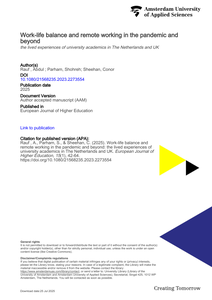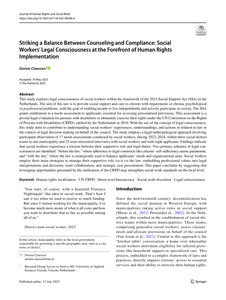Poor work-life balance (WLB) has been linked to negative outcomes such as increased stress, anxiety, depression, and a perceived reduction in the overall quality of life. At an institutional level, these may include lowered employee commitment and decreased productivity at work. The advent of COVID-19 has necessitated fundamental alterations to work experience and the ways in which WLB may be perceived. This phenomenological study employed qualitative, in-depth interviews to explore higher education academics’ lived experiences of remote working and how they perceived this had impacted their well-being (WB) and WLB. Using purposive samplings, respondents were drawn from HE sectors in the Netherlands, and the UK. The findings offered an understanding of how remote and hybrid teaching delivery during the pandemic affected academics’ actual experiences of WB and WLB. These findings serve to enhance policymakers’ understandings of significant occupational health and WB issues within a post-pandemic education service paradigm.
DOCUMENT

At present, COVID-19 has caused a possible paradigm shift in education, especially in education delivery for higher educational and learning institutions. To align with the national government and relevant national/international authorities’ policies and to avoid the spread of the virus, educational institutions in many nations have decided to temporarily suspend the traditional classroom-based education and replace it with online-based education. This studyaims at exploring the impact of COVID-19 pandemic and obligatory remote working on work-life balance, mental health and productivity of faculty members working in higher education institutions (HEI). The study is exploratory and uses a qualitative approach using an online survey strategy to include voices of faculty members from different countries. While the results of this study indicate both positive and negative effects of obligatory remote working on faculty members’ work-life balance, well-being and productivity at the same time our findings indicate that university administration must pay heed to address concerns presented in the results.
MULTIFILE

Background: There are indications that older adults who suffer from poor balance have an increased risk for adverse health outcomes, such as falls and disability. Monitoring the development of balance over time enables early detection of balance decline, which can identify older adults who could benefit from interventions aimed at prevention of these adverse outcomes. An innovative and easy-to-use device that can be used by older adults for home-based monitoring of balance is a modified bathroom scale. Objective: The objective of this paper is to study the relationship between balance scores obtained with a modified bathroom scale and falls and disability in a sample of older adults. Methods: For this 6-month follow-up study, participants were recruited via physiotherapists working in a nursing home, geriatricians, exercise classes, and at an event about health for older adults. Inclusion criteria were being aged 65 years or older, being able to stand on a bathroom scale independently, and able to provide informed consent. A total of 41 nursing home patients and 139 community-dwelling older adults stepped onto the modified bathroom scale three consecutive times at baseline to measure their balance. Their mean balance scores on a scale from 0 to 16 were calculated—higher scores indicated better balance. Questionnaires were used to study falls and disability at baseline and after 6 months of follow-up. The cross-sectional relationship between balance and falls and disability at baseline was studied using t tests and Spearman rank correlations. Univariate and multivariate logistic regression analyses were conducted to study the relationship between balance measured at baseline and falls and disability development after 6 months of follow-up.
DOCUMENT

“Municipal Youth Work taken over by Christians”. (Binnenlands Bestuur, 2009) This heading refers to the work of Youth for Christ in an Amsterdam neighbourhood. This organisation, successful in Youth Work nationwide, last year came out first in an open competition of the Amsterdam district De Baarsjes. Because of this they were commissioned to undertake all the youth work in this multicultural neighbourhood. The conditions were not to evangelise and not to limit recruitment of personnel inside their own circle but to recruit from outside the organisation as well. When they later appeared to have put a job advertisement only on their own website, this led to heated debates. Finally Youth for Christ acknowledged and rectified this mistake. This example is a concrete illustration of the actual and sometimes delicate relationships between philosophy of life and social work
DOCUMENT

Work during vacation is publicly and theoretically seen as detrimental to vacationers' quality of life. This study investigated whether work during vacation affects vacationers' quality of life in terms of intensity of felt emotions and needs fulfillment. A sample of international tourists in the Netherlands (N = 374) took part in a street survey. Findings indicate that workers' and nonworkers' emotional experience is not statistically different during vacation. The fulfillment of needs is also identical between workers and nonworkers. Ninety-seven percent of workers are satisfied with the balance between work and leisure time during vacation. These findings suggest that working tourists effectively combine work and leisure. Some dissatisfaction did arise from the lack of certain work facilities. Implications for the tourism industry and suggestions for further research are provided.
MULTIFILE

In clinical practice, formal elements of art products are regularly used in art therapy observation to obtain insight into clients’ mental health and provide directions for further treatment. Due to the diversity of formal elements used in existing studies and the inconsistency in the interpretation, it is unclear which formal elements contribute to insight into clients’ mental health. In this qualitative study using Constructivist Grounded Theory, eight art therapists were interviewed in-depth to identify which formal elements they observe, how they describe mental health and how they associate formal elements with mental health. Findings of this study show that art therapists in this study observe the combination of movement, dynamic, contour and repetition (i.e., primary formal elements) with mixture of color, figuration and color saturation (i.e., secondary formal elements). Primary and secondary elements interacting together construct the structure and variation of the art product. Art therapists rarely interpret these formal elements in terms of symptoms or diagnosis. Instead, they use concepts such as balance and adaptability (i.e., self-management, openness, flexibility, and creativity). They associate balance, specifically being out of balance, with the severity of the clients’ problem and adaptability with clients’ strengths and resources. In the conclusion of the article we discuss the findings’ implications for practice and further research.
DOCUMENT

Het Nieuwe Werken concept (HNW) kenmerkt zich onder andere door de grote mate van vrijheid voor medewerkers om tijd- en plaatsonafhankelijk te werken. Microsoft Nederland was in 2007 één van de eerste organisaties die dit concept vergaand doorvoerde. Zeven jaar na dato hebben wij onderzoek gedaan naar de mate waarin de vrijheid ten aanzien van werktijden het leef- en werkritme van de medewerkers heeft beïnvloed. Als eerste hebben we een klein kwantitatief onderzoek uitgevoerd om na te gaan in hoeverre medewerkers er nieuwe ritmes op nahielden. Daaruit bleek onder andere dat er op dit gebied geen grote veranderingen hebben plaatsgevonden. Naar aanleiding hiervan hebben we interviews gehouden om te achterhalen welke motieven er spelen bij het vasthouden aan traditionele werktijden. Uit het onderzoek bleek dat medewerkers weliswaar zeer tevreden zijn met de geboden vrijheid, maar dat verbindende factoren als familie, klanten en collega’s belangrijke factoren zijn bij het handhaven van een traditioneel leef- en werkritme.
DOCUMENT

Background: Parents of children with profound intellectual and multiple disabilities (PIMD) have extensive care duties. This study describes the phenomenon “parenting a child with PIMD.” Method: We conducted in-depth interviews with 25 Dutch parents. A reflective lifeworld research. Findings: The essential meaning of the phenomenon was understood as “continuously struggling to create and maintain new equilibriums that protect the child and the family from hardship; changing in context through time.” The following eight constituents were identified: (1) medical complexity; (2) multidimensional weariness; (3) care for siblings; (4) social connectedness; (5) uncertainty about the future; (6) wrecking bureaucracy; (7) dependency on healthcare delivery; and (8) financial concerns. Conclusions: Healthcare services should provide families with easy access to assistive technology and services needed to manage family life. Responsiveness to parents’ challenges offers them the possibility to participate in society. Healthcare professionals should address the parents’ perspectives related to the child’s quality of life.
DOCUMENT

This study explores legal consciousness of social workers within the framework of the 2015 Social Support Act (SSA) in the Netherlands. The aim of this law is to provide social support and care to citizens with impairments or chronic psychological or psychosocial problems, with the goal of enabling people to live independently and actively participate in society. The SSA grants entitlement to a needs assessment to applicants, essential for accessing personalized provisions. This assessment is a pivotal legal evaluation for persons with disabilities to ultimately exercise their rights under the UN Convention on the Rights of Persons with Disabilities (CRPD), ratified by the Netherlands in 2016. With the use of the concept of legal consciousness, this study aims to contribute to understanding social workers’ experiences, understandings, and actions in relation to law in the context of legal decision-making on behalf of the council.
MULTIFILE
